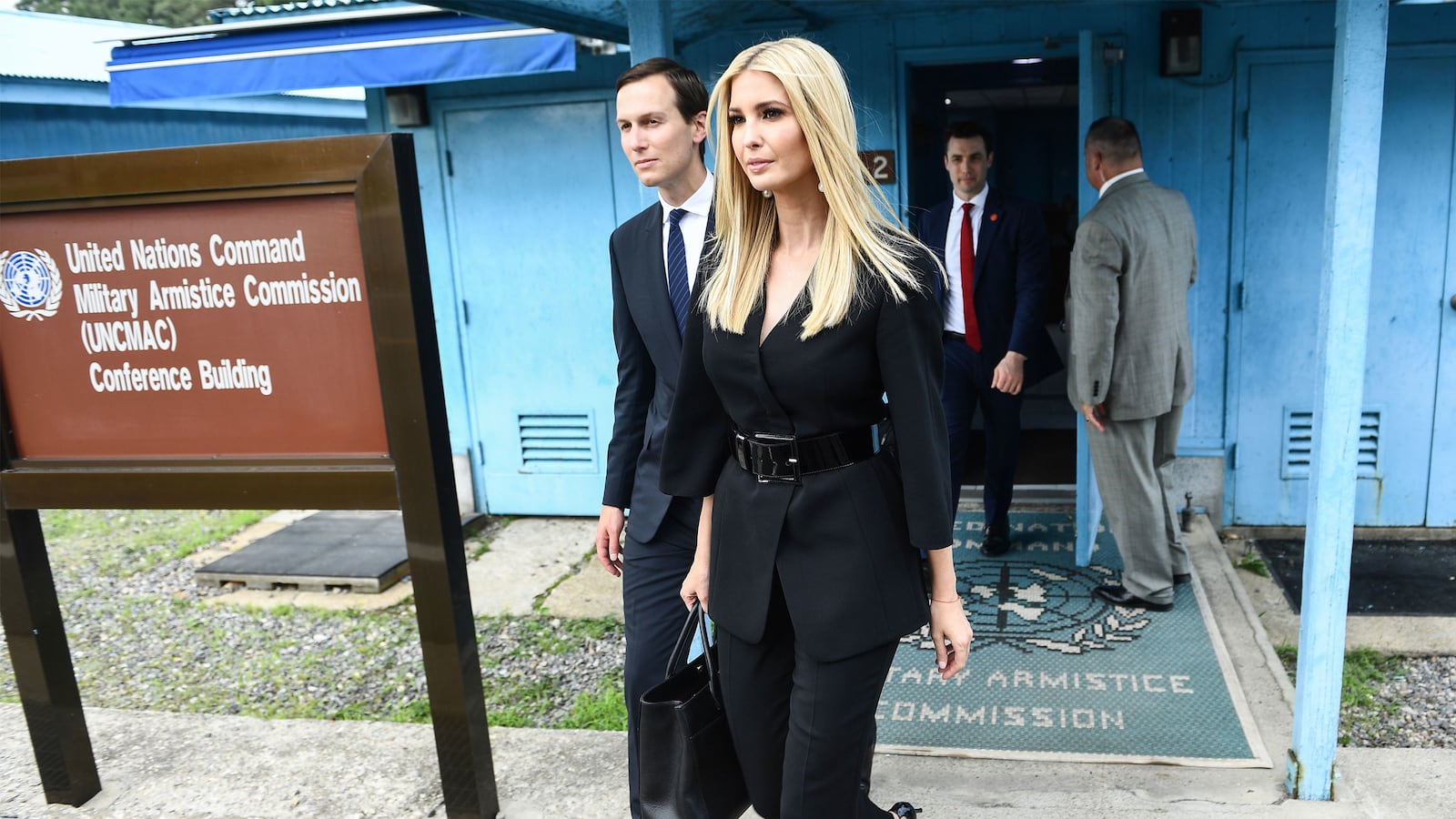When Donald Trump and his advisers crossed over from South Korea into the heavily fortified demilitarized zone between North and South Korea over the weekend, the cameras were ready. Images of the president greeting North Korean dictator Kim Jong Un as “my friend” in a last-minute meetup streamed across televisions worldwide.
Trump wasn’t alone. After a few snapshots, Ivanka Trump, along with her husband, Jared Kushner, followed the president into what’s known as the Freedom House—a building on the South Korean side of the zone. That’s when the cameras stopped. The media was reportedly blocked from entering and covering the historic event.
It wasn’t until later that reporters learned Ivanka and Kushner did more than accompany the president into the Freedom House. They were reportedly present at a closed-door meeting between the two leaders, who ended up speaking about one of the most sensitive topics on the planet—North Korea’s nuclear-weapons program.
(The White House did not immediately respond to a request for comment. After this story was published, an official reached out and said: “Although they met Kim, Jared and Ivanka did not participate in the closed-door meeting.” The official did not clarify which meeting Ivanka and Jared participated in or how many meetings were held on the border. But two other officials told The Daily Beast that Ivanka and Kushner were in the room for part of the conversations that pertained to nuclear weapons and sanctions.
President Trump has long used his family, particularly his son-in-law, to run various foreign-policy projects, leading to investigations on Capitol Hill over security clearances and the administration’s circumvention of traditional foreign-policy procedure. Former Secretary of State Rex Tillerson said in a recent congressional interview that he was often left in the dark about various high-stakes foreign-policy decisions because Kushner at times ran his own shadow State Department, meeting secretly with world leaders from countries such as Mexico and Saudi Arabia.
The meeting in the DMZ seemed to spur a new sense of frustration in Washington on Monday, this time directed in particular at the first daughter, who was also present—front and center—at the G-20 summit in Hamburg. She provided a video readout about the conversations Trump had with Indian Prime Minister Narendra Modi and took photo-ops with attendees.
“Ivanka has participated in previous bilateral meetings, and on behalf of the White House at past G-20 summits,” said Garrett Marquis, a spokesperson for the National Security Council. “Issues of women’s empowerment are central to the president’s national-security and women’s peace and security strategies.”
Photos and video footage from the conference emerged over the weekend, showing Ivanka mingling with some of the top world leaders, inserting herself into conversations with veterans of the foreign-policy world. The internet erupted, and lawmakers took to social media.
“It may be shocking to some, but being someone’s daughter actually isn’t a career qualification,” Rep. Alexandria Ocasio-Cortez (D-NY) said on Twitter. “It hurts our diplomatic standing when the President phones it in & the world moves on.”
One senior administration official told The Daily Beast that the Trump team often tries to find roles for Ivanka on travels overseas because she is a talented spokesperson. But it is unclear what Ivanka was doing in North Korea beyond the purely ceremonial. Two senior administration officials and one former one said they do not consider the president’s daughter a significant player on major foreign-policy initiatives, including on the Koreas, though they all acknowledged that President Trump will at least solicit her advice for gut checks on any manner of foreign-policy and national-security decision: striking other countries, climate agreements, and so on.
“She matters because the president says she matters,” the former official said. “Who in their right mind would cross her knowing that?”
A current official noted that Ivanka is often in the room during important policy discussions and read-into those matters specifically, and at times exclusively, because her father demanded it.
It’s not only Trump’s aides and advisers who have taken note of that; foreign leaders have factored it into their diplomacy and flattery of Trump, as well. Prime Minister Shinzo Abe is known to go out of his way to ask the president how Ivanka is doing and ask about her interest in global women’s empowerment projects, another one of the current senior Trump administration officials said.

Still, Ivanka’s protected status in the Trump orbit has frustrated several high-ranking aides over the years, including the president’s one-time chief strategist Steve Bannon and former White House Chief of Staff John Kelly, the latter of whom reportedly complained in private that Ivanka is merely “playing government,” according to a CNN report early last year.
That report came at a time when Ivanka’s trip to South Korea, as leader of a U.S. delegation at the closing ceremony of the Winter Olympics, perplexed, if not outright aggravated, several of her fellow senior colleagues, chief among them Kelly, a former White House official said.
Lawmakers on Capitol Hill have looked into how and why the administration’s foreign policy has shifted at the hands of Trump’s family. The House Foreign Affairs Committee, in particular, has scrutinized Kushner’s relationship with Saudi Crown Prince Mohammed bin Salman. Tillerson, in his interview with the committee in May, said the inclusion of Ivanka and Kushner in the national-security process made his job more difficult.
“One of the challenges I think that everyone had… to learn to deal with was the role, the unique situation with the president’s son-in-law [Kushner] and daughter [Ivanka] being part of the White House advisory team,” Tillerson said. “There was not a real clear understanding of the role, responsibilities, authorities… which made it challenging for everyone.”







